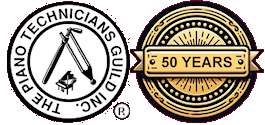The most frequently asked question at Sweeney Piano
for the past 35 years:
"Is my piano worth restoring?"
We at Sweeney Piano almost always say "yes, most likely" to this number one question from our customers. Even before seeing your piano, we venture a "yes" because our experience over the past thirty-five years has confirmed the fact that most pianos can be restored and with wonderfully satisfying results.
"But, is my piano worthy of restoration?"
There are good reasons for saying "yes" to restoration. Some will say yes because the piano is a family treasure. Some will say yes because the piano has been played by famous hands. Others will say yes because their piano has "incredible curves" encased in outstanding veneers. Parents will say, "Our kids grew up on this piano." Musicians will say "It's been my good friend all these years, my stage companion" Some simply say, "It's just my piano; it needs to be fixed."
"My tuner told me my piano's a 'piece of junk' and impossible to tune."
If someone tells you your piano is junk, we at Sweeney Piano suspect that judgment to be wrong. We recommend a second opinion. We would be surprised to actually find that your piano is a piece of junk. It might be true that your piano is difficult, or currently impossible to tune, but that difficulty probably means your piano needs repair. Of course, we could be wrong -- maybe your piano really is unredeemable, but we would be surprised.
"I love this piano, it's been in our family for generations, but my new technician told me to buy a new piano."
Over the course of our thirty-five years in the piano restoration business, we have encountered would-be technicians who would condemn a piano because it needs new parts. As silly as that sounds, it's true. We find this, especially, in those new to the field, or those solely reliant upon digital tuning devices, or those who refuse to do repairs because they don't want to do anything other than tune. For this very limited type of service, the tuner must find the piano in good working order. If anything is in need of repair, the tuner cannot proceed. "Your piano is worthless; it won't keep a tune. You need a new piano," is often the response.
We rarely agree with such an assessment. In the hands of an experienced restorative technician, what was judged to be dead wood and worthless, might very well be brought back to life.
"The cabinet and mechanics seem fine, and it stays in tune, but the soundboard sounds muddy and dull, and it buzzes when certain notes are played."
Some piano technicians will say it's time to consider a newer piano if the piano in question has a severely cracked or 'shredded' sound board. But again, this is not always the only option. Soundboards are often repaired, buzzes removed, and if the piano is otherwise in good shape, even an irreparable soundboard can be replaced. This is an option to consider, especially, if the cabinet of the piano is important to you, or if the history of the piano is significant.
Let us help.

 Is My Piano Worth Restoring?
Is My Piano Worth Restoring? WE ARE GRATEFUL TO CELEBRATE BEING IN BUSINESS DOING WHAT WE LOVE FOR 50 YEARS
WE ARE GRATEFUL TO CELEBRATE BEING IN BUSINESS DOING WHAT WE LOVE FOR 50 YEARS